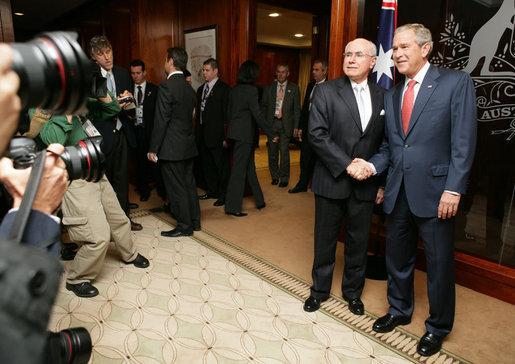
Consider what the Howard government could know and ask in 2002 and early 2003 before committing to the blunder that is the Iraq war.
No 20/20 hindsight. No fatuous effort to blame Australia for the map-drawing efforts of European colonial powers or the religious forces launched long ago by the prophet Muhammad.
Merely what the Howard government could have focused on as it prepared to be part of an invading coalition and an occupying power.
As Howard notes, this was ‘the most controversial foreign policy decision taken by my Government, in the almost 12 years it held office.’ Controversial not just for its effects, but for the way it was taken; what was considered and how it was done. And the ultimate reality that the overriding reason for war, for Australia, was the US alliance, not the issues of Iraq.
If the big cabinet submission that never was had been ordered, what would have been discussed? Beyond the military issues of invasion, four areas are obvious:
- Intelligence
As previously discussed, the WMD intelligence was thin. To make the obvious point that it was wrong is to do the 20/20 stuff. Suffice to say that a government truly considering all options—and Howard wasn’t—would have wanted the intelligence stress-tested and argued over.
The retrospective view from John Howard is that the ‘belief that Saddam had WMDs was near universal,’ while quoting the Office of National Assessments that the evidence ‘paints a circumstantial picture that is conclusive overall rather than resting on a single piece of irrefutable evidence’.
The intelligence was to be the basis for a preventive war, not just a political debate. If the intelligence was a circumstantial picture, then other factors must weigh heavily, such as a discussion of what would happen in a conquered Iraq.
- The nature and future of Iraq
No great 20/20 knowledge is needed to invoke the line variously attributed to Talleyrand, Napoleon or Cavour: you can do a lot of things with bayonets, but you can’t sit on them. You’d have to have drunk some powerful Washington neocon Kool-Aid to think those bayonets would quickly transform Iraq into a peaceful, thriving democracy. As war loomed, lots of expert voices were denouncing that vision as delusional. Ten years after the invasion, John Howard gave this version of what went wrong:
The post invasion conflict, especially between Sunnis and Shiites, which caused widespread bloodshed, did more damage, in my judgement, to the credibility of the coalition operation in Iraq than the failure to find stockpiles of WMDs. Persecution by the pro Saddam Sunnis of the Shia majority had been a feature of Iraq for the previous twenty years. It was inevitable that after Saddam had been toppled a degree of revenge would be exacted, but a stronger security presence would have constrained this.
Ponder how those thoughts would have been considered in the crucial cabinet submission that wasn’t written. Take as the text for that submission an article written in February, 2003, six weeks before the war by Rory Steele, Australia’s ambassador to Iraq from 1986 to 1988.
Offering a brisk survey of Iraq’s artificial nature as a country and the Sunni–Shia split, Steele judged that the invasion would be the easy part. After that, the mother of all messes as Iraq turned to chaos:
New questions will arise daily, of legitimacy, of policing, in a situation of revenge killings, armed resistance and terrorism. With Iraq risking fracture, the coalition of the willing that entered may find it is in for a much longer and murkier haul than expected. Its hope will be to exit quickly, leaving Iraq in good order. The peacekeepers’ role could be thankless, dangerous and open-ended.
Stress: no 20/20 hindsight, but a judgement offered before the invasion about a fractured Iraq. Having pondered that understanding of Iraq, the non-existent cabinet submission could then turn to the impact on the Middle East of overthrowing Saddam. This is where my next post will pick up.